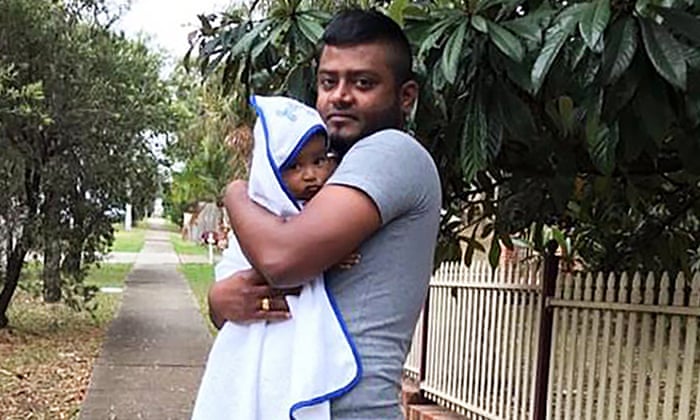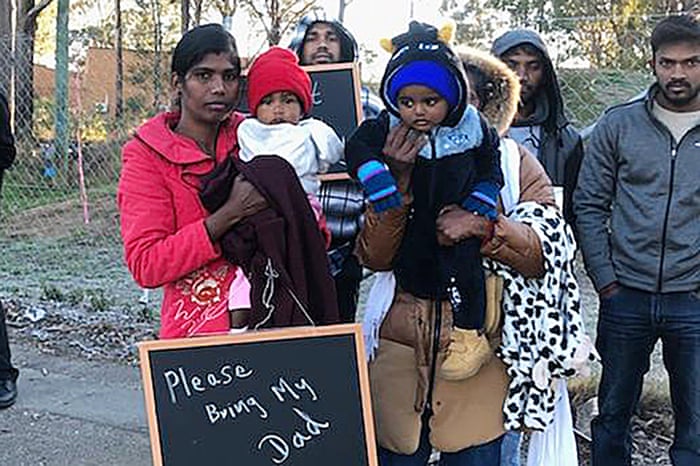Australia deports Tamil asylum seeker, separating him from baby daughter
Thileepan faces permanent separation from his wife and child, who have been granted safe haven visas Tamil asylum seeker Thileepan and his daughter. Thileepan was deported in the middle of the night Monday more than six years after arriving in Australia. Photograph: Tamil Refugee Council
Tamil asylum seeker Thileepan and his daughter. Thileepan was deported in the middle of the night Monday more than six years after arriving in Australia. Photograph: Tamil Refugee Council Ben Doherty@bendohertycorro-
Ben Doherty@bendohertycorro-A 30-year-old Tamil asylum seeker faces permanent separation from his wife and 10-month-old Australian-born daughter, after being deported more than six years after arriving in Australia.
Thileepan (like many Tamils he only uses one name) had been in Australia since arriving by boat in June 2012. He lived in the community for most of his time in Australia, marrying in 2016. He was taken into immigration detention earlier this year, after his claim for protection was rejected.
He was issued a removal notice on Friday, and was removed from Australia in the middle of the night Monday.
His wife, who arrived separately in September 2012, and 10-month-old Australian-born daughter, were among the demonstrators gathered at the gates of Villawood, in Sydney’s west on Monday.
Thileepan’s wife and daughter were both granted safe haven enterprise visas on Wednesday last week, two days before he was issued with the removal notice.
Their separation will almost certainly be permanent. A safe haven enterprise visa – known as a Shev – does not allow for family reunion, so Thileepan’s wife cannot sponsor him to return to Australia. And because of her “well-founded fear of persecution” – recognised by the Australian government – she cannot return to Sri Lanka.
Thileepan’s father and brother were killed during Sri Lanka’s brutal 26-year civil war, which ended in 2009 when the separatist Liberation Tigers of Tamil Eelam were crushed by a final offensive by government of Sri Lanka troops.
But, according to the UN, up to 40,000 civilians were also killed in the final bloody months of fighting, with no-fire zones and hospitals deliberately shelled. Another of Thileepan’s brothers is still missing, one of thousands in Sri Lanka never found after the war.
Thileepan told Australian authorities that during the Sri Lankan conflict he was kidnapped from his home by Sri Lankan security forces, blindfolded, beaten and tortured about his knowledge of LTTE activities.
He was later dumped, still blindfolded, on the side of the road where he was found.
In July 2017, the UN’s special rapporteur Ben Emmerson visited Sri Lanka and reported that “the use of torture has been, and remains today, endemic and routine, for those arrested and detained on national security grounds”.
 Thileepan’s wife and daughter outside Villawood detention centre. Photograph: Tamil Refugee Council
Thileepan’s wife and daughter outside Villawood detention centre. Photograph: Tamil Refugee Council“Entire communities have been stigmatised and targeted for harassment and arbitrary arrest and detention, and any person suspected of association, however indirect, with the LTTE remains at immediate risk of detention and torture,” Emmerson wrote.
However, Thileepan’s claim for protection was rejected by the Australian government, which said his circumstance did not raise Australia’s protection obligations. There were no “character” or criminal matters associated with Thileepan’s case.
The issue of family separations has become a focal point of immigration debates worldwide. In the US, the Trump administration faced massive public backlash after separating children from their parents at the Mexican border. Donald Trump relented but hundreds of children remain separated from their families.
Australia routinely separates families within its immigration regime. At least half a dozen fathers on Nauru have never met their children, after their pregnant partners were taken to Australia to give birth. Husbands and wives, as well as siblings and parents, are separated by Australia’s offshore processing system.
Family unity is a fundamental principle of international and Australian domestic law. Australia is a party to the convention on the rights of the child, which states that children have a right to know and be cared for by their parents, and should grow up in a family environment wherever possible. It is also a party to the international covenant on civil and political rights, which says the family “is the natural and fundamental group unit of society and is entitled to protection by society and the state”.
Guardian Australia put a series of questions regarding Thileepan’s case and slated removal to the Department of Home Affairs. These have not been responded to.
Aran Mylvaganam, a spokesman for the Tamil Refugee Council, said the Australian government “trumps Trump when it comes to breaking up families”.
“How much evidence of human rights abuses in Sri Lanka will be enough for the minister to grant people their right to protection?” he said. “How much trauma is he willing to inflict on Tamil families to make a political point?”
Sarah Dale, principal solicitor of the Refugee Advice and Casework Service said ministers within the home affairs department should intervene to stop Thileepan’s removal.
“It is an unnecessary traumatic separation of the family unit who have been recognised as refugees,” she said. “It is absolutely the right thing to do to keep them together in safety.
“Australia owes protection, particularly to children, and this separation is absolutely contrary to the best interests of this child.”
